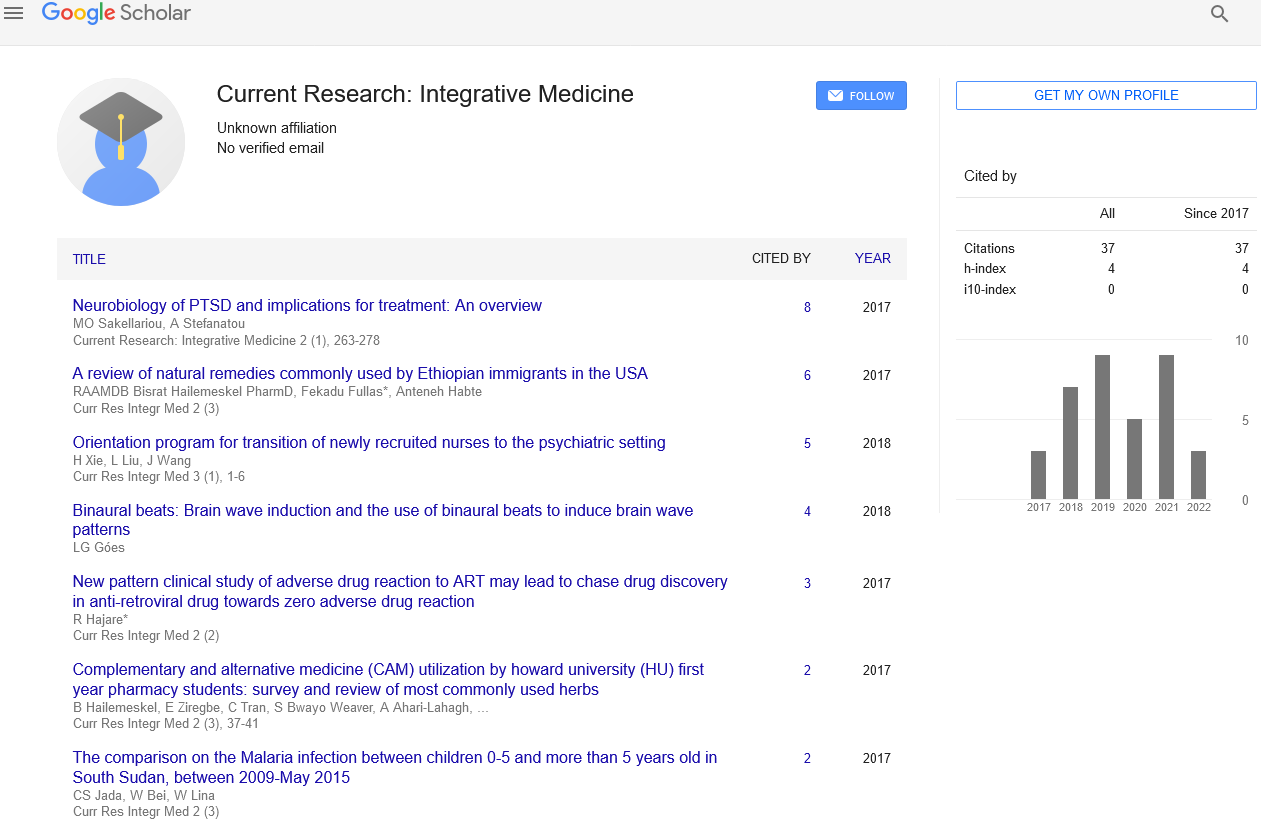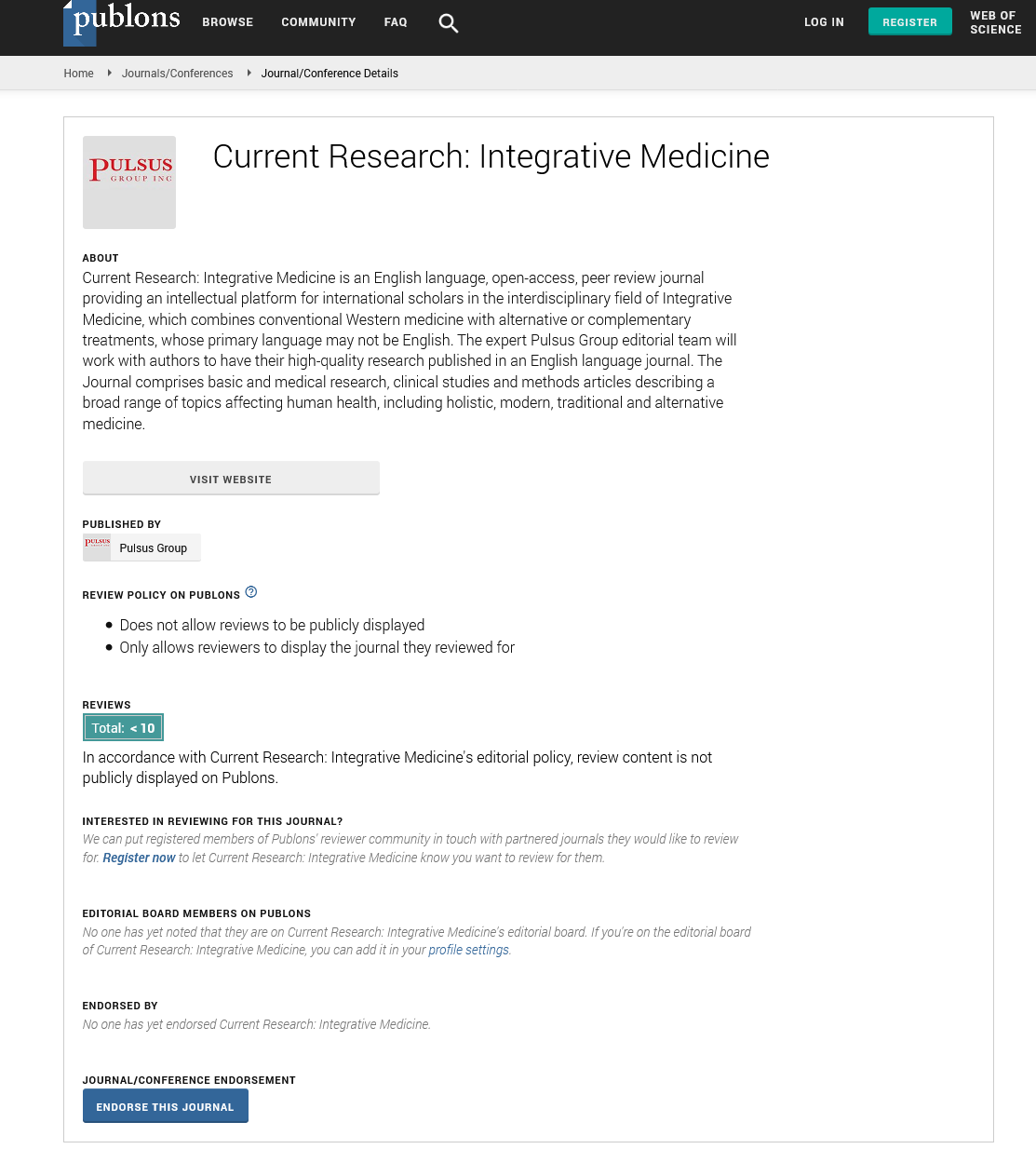Homeopathy: A controversial alternative medicine
Received: 15-Jul-2024, Manuscript No. pulcrim-24-7110; Editor assigned: 17-Jul-2024, Pre QC No. pulcrim-24-7110(PQ); Accepted Date: Jul 22, 2024; Reviewed: 17-Jul-2024 QC No. pulcrim-24-7110(Q); Revised: 20-Jul-2024, Manuscript No. pulcrim-24-7110(R); Published: 25-Jul-2024
This open-access article is distributed under the terms of the Creative Commons Attribution Non-Commercial License (CC BY-NC) (http://creativecommons.org/licenses/by-nc/4.0/), which permits reuse, distribution and reproduction of the article, provided that the original work is properly cited and the reuse is restricted to noncommercial purposes. For commercial reuse, contact reprints@pulsus.com
Abstract
Homeopathy, a system of alternative medicine founded in the late 18th century, has sparked considerable debate regarding its efficacy and scientific validity. Proponents argue that homeopathy offers a gentle and natural approach to healing, while critics dismiss it as pseudoscience. This article explores the principles of homeopathy, examines the evidence for and against its effectiveness, and considers its place in modern healthcare.
Key Words
Homeopathy; Alternative medicine; Efficacy; Pseudoscience; Modern healthcare
Introduction
Homeopathy, developed by Samuel Hahnemann in 1796, is based on two main principles: "like cures like" and the "law of infinitesimals." The former suggests that a substance causing symptoms in a healthy person can cure similar symptoms in a sick person, while the latter posits that diluting a substance increases its potency. Despite its widespread use, homeopathy remains highly controversial, with critics labeling it as ineffective and unscientific. This article delves into the ongoing debate, evaluating the arguments from both sides and exploring the implications for healthcare.
The principles of homeopathy
Homeopathy is grounded in the belief that the body has an innate ability to heal itself. Practitioners use highly diluted substances, known as remedies, which are believed to trigger the body's selfhealing mechanisms. The preparation of these remedies involves a process called potentization, where a substance is repeatedly diluted and shaken. Advocates argue that this process imprints the "memory" of the original substance onto the water or alcohol used for dilution, thereby enhancing its therapeutic effect.
Evidence for efficacy
Proponents of homeopathy cite numerous anecdotal reports and patient testimonials as evidence of its efficacy. They argue that homeopathic treatments are personalized, taking into account the patient's physical, emotional, and psychological state. Some clinical trials and observational studies have reported positive outcomes, suggesting that homeopathy may be effective for conditions such as allergies, migraines, and rheumatic diseases.
Additionally, homeopathy is often praised for its holistic approach and lack of adverse side effects. In an era where conventional medicine can sometimes result in significant side effects or dependency, homeopathy offers a seemingly risk-free alternative. This appeal is particularly strong among individuals seeking more natural and less invasive treatment options.
Criticism and scientific scrutiny
Despite its popularity, homeopathy faces substantial criticism from the scientific community. Critics argue that the principles of homeopathy contradict fundamental scientific concepts, particularly the notion of potentization. According to conventional science, diluting a substance to the extent practiced in homeopathy should render it ineffective, as no molecules of the original substance remain.
Numerous systematic reviews and meta-analyses have concluded that homeopathic remedies perform no better than placebos. A 2010 report by the House of Commons Science and Technology Committee in the UK stated that homeopathy is "scientifically implausible" and that the evidence does not support its efficacy. The report recommended that the National Health Service (NHS) cease funding homeopathic treatments.
Additionally, the placebo effect is often cited as a key factor in the perceived success of homeopathy. Patients may experience improvements in their condition simply because they believe they are receiving effective treatment, rather than due to any intrinsic properties of the homeopathic remedy itself.
Homeopathy in modern healthcare
The integration of homeopathy into modern healthcare systems varies widely across countries. In some regions, homeopathy is widely accepted and even covered by health insurance, while in others, it is marginalized and criticized. The debate over its inclusion in healthcare often hinges on issues of patient choice, cost-effectiveness, and the ethical implications of providing treatments deemed ineffective by the scientific community.
Advocates argue that patients should have the right to choose their preferred method of treatment, and that homeopathy can be a valuable complementary therapy when used alongside conventional medicine. They also point to the lower cost of homeopathic remedies compared to some pharmaceutical drugs, suggesting that homeopathy could offer a cost-effective solution for healthcare systems under financial strain.
Conversely, critics contend that endorsing homeopathy in any form legitimizes a practice lacking scientific credibility, potentially misleading patients and diverting resources from more effective treatments. They stress the importance of evidence-based medicine and caution against the risks of relying on unproven therapies for serious health conditions.
Conclusions
The debate over homeopathy is unlikely to be resolved in the near future, as it touches on deeply held beliefs about health, healing, and the role of science in medicine. While homeopathy continues to attract a significant following, its lack of scientific validation remains a major hurdle. Patients and healthcare providers must navigate this contentious landscape, balancing personal beliefs and preferences with the best available evidence.
As the discussion around homeopathy evolves, it is crucial to maintain an open dialogue, respecting diverse perspectives while striving for a healthcare system grounded in scientific integrity. Whether homeopathy will ultimately find a place alongside conventional medicine or be relegated to the fringes remains to be seen, but its enduring presence in the medical discourse underscores the complexity of health and healing in the modern world.






